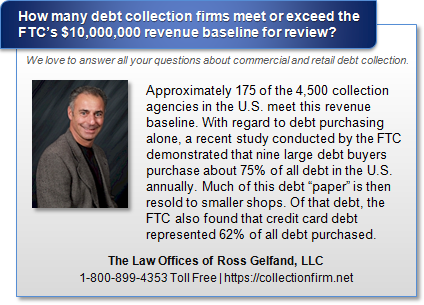 |
| Image courtesy of cooldesign / freedigitalphotos.net |
Ever since
the new policies of the Federal Trade Commission (FTC) and Consumer Financial
Protection Bureau (CFPB) went into action over the past few months, bringing
with them a sustained focus on collection agencies and collection law firms
that has yet to abate, there has been a perceived shift in the industry. Banks and other large players in the debt
field have put severe restrictions on who they will sell “paper” to,
restrictions which have had the practical effect of freezing out the smaller collection
agencies. At the same time, many small
firms have shown a disinterest in buying all but the most sparklingly well-documented
paper for fear of running afoul of the newly watchful Federal Government. The spate of charges and lawsuits brought by
the FTC in recent months has underscored the new reality: Shady practices and
robo-signed no-doc debts or contested debts will no longer fly for very long.
The market for paper has thus been in a depressed
state, as in many ways, the FTC has forced the larger collection agencies who
meet the $10,000,000 revenue baseline to collude against smaller agencies as a
form of self-defense. They want the scrutiny to go away, and as such feel they
can’t afford to be connected to smaller firms who might play fast and loose
with disclosure and documentation regulations.
There are signs that smaller firms are ready to start
buying paper again. After all, the debt
business in the U.S. alone is worth $12.2 billion annually. That means, no matter how large the big
players are, there is a lot of money left over for small firms to reap. And the larger firms can’t afford to take on
smaller debts that aren’t cost-effective for them to handle, traditionally the
impetus to sell paper off down the food chain.
However,
while most experts in the field feel certain that the small firms will begin
buying paper in bulk again soon, so far there has been no overt sign that this
gold rush has begun.





.png)

